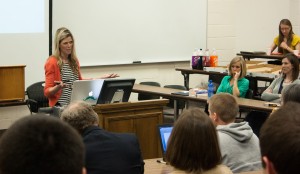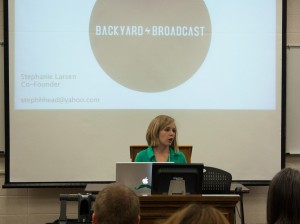
A woman whose mother was the fourth generation of a chain of sex trafficking victims spoke at the J. Reuben Clark Law School on Feb. 26.
“Without (my mother) and her strength, I would have been the fifth generation trafficked in my family,” said Stephanie Larsen, who came to BYU representing the Salt Lake City-based awareness organization she co-founded called Backyard Broadcast.
A report issued in 2009 by leading advocacy group Shared Hope International estimated that 83 minors were trafficked for sexual purposes in the Salt Lake City area from 1996 to 2008. Over 100,000 children are trafficked every year in the United States, and the average age a victim is first trafficked is 13, also according to Shared Hope.
Sex trafficking is a hidden but present problem. Larsen said that after one Backyard Broadcast presentation at UVU a student came forward to say that she’d been sold by a family member since she was in third grade. A principal at Cottonwoods Heights High School knew of at least one victim in the student body there also, Larsen said.
In her lecture at the Law Building, Larsen asked attendees to participate in the “Raise Your Grade” letter-writing campaign, which is designed to persuade governors to improve laws related to sex trafficking. Utah’s laws received a “D” grade in Shared Hope’s 2012 national report card, as did sixteen other states.
One reason for the low grade was related to a failure in Utah state law to properly punish people who pay for sex, usually called “Johns,” said the report. While possession of child pornography is a felony charge with a maximum sentence of 15 years and a fine of $10,000, patronizing a prostitute is a class B misdemeanor with a maximum sentence of just six months in jail, a $1,000 fine, and does not mandate registration as a sex offender.
Law student Jon Edwards said that Utah’s status surprised him.
“I was surprised that Utah has a D for a grade,” Edwards said, mentioning the state’s focus on families. “I would have thought that Utah … would be taking better care of kids.”
Larsen also recommended that attendees help end sex trafficking by changing the terms they use to talk about it.
“One of the problems is we often hear about it in the media as prostitution, when really there’s no willingness,” Larsen said about press coverage of children arrested in commercial sex transactions.
Larsen explained that calling the underage girls prostitutes carries an implication that it’s their fault. But these underage girls are forced into the acts — often by pimps, and often by family members.

The BYU chapter of the National Lawyers Guild organized the event. Co-president Brooke Robinson first became interested in the sex-trafficking problem as a BYU undergraduate during a class called The International Political Economy of Women, and ended up following that interest to the BYU law program.
“I felt like (a law career is) where you can get those effective tools to fight human rights abuses,” Robinson said.
After Larsen’s presentation Robinson also encouraged attendees to make a positive difference.
“Especially here at BYU, we know the value of people. We know we have infinite worth, and that any change is worth it and (that) if we can just help out one child, that’s worthwhile,” Robinson said.
Wendy Archibald, an assistant dean in the law school, expressed a similar desire.
“I hope our students will take the simple step of writing the letter requested by the speaker. As the speaker pointed out, great change can be made with a small effort on the part of many,” Archibald said.
“I further hope that no matter where they practice or work, these students will maintain a raised awareness of challenging issues in society understanding that we all have a responsibility to support and serve those in need,” Archibald said.




